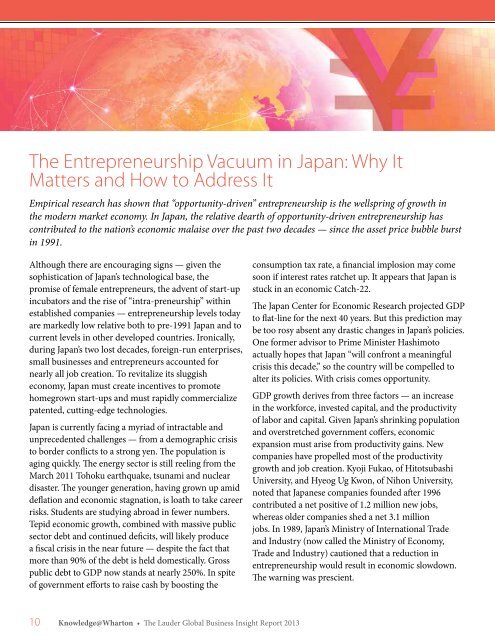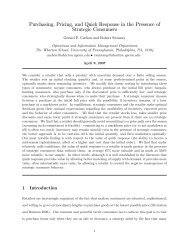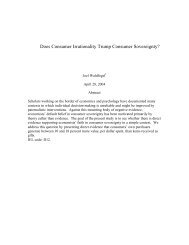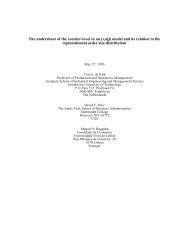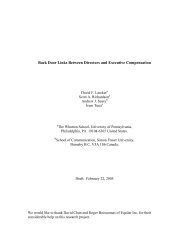building blocks for the Global economy - Knowledge@Wharton
building blocks for the Global economy - Knowledge@Wharton
building blocks for the Global economy - Knowledge@Wharton
You also want an ePaper? Increase the reach of your titles
YUMPU automatically turns print PDFs into web optimized ePapers that Google loves.
The entrepreneurship Vacuum in Japan: Why it<br />
Matters and how to address it<br />
Empirical research has shown that “opportunity-driven” entrepreneurship is <strong>the</strong> wellspring of growth in<br />
<strong>the</strong> modern market <strong>economy</strong>. In Japan, <strong>the</strong> relative dearth of opportunity-driven entrepreneurship has<br />
contributed to <strong>the</strong> nation’s economic malaise over <strong>the</strong> past two decades — since <strong>the</strong> asset price bubble burst<br />
in 1991.<br />
Although <strong>the</strong>re are encouraging signs — given <strong>the</strong><br />
sophistication of Japan’s technological base, <strong>the</strong><br />
promise of female entrepreneurs, <strong>the</strong> advent of start-up<br />
incubators and <strong>the</strong> rise of “intra-preneurship” within<br />
established companies — entrepreneurship levels today<br />
are markedly low relative both to pre-1991 Japan and to<br />
current levels in o<strong>the</strong>r developed countries. Ironically,<br />
during Japan’s two lost decades, <strong>for</strong>eign-run enterprises,<br />
small businesses and entrepreneurs accounted <strong>for</strong><br />
nearly all job creation. To revitalize its sluggish<br />
<strong>economy</strong>, Japan must create incentives to promote<br />
homegrown start-ups and must rapidly commercialize<br />
patented, cutting-edge technologies.<br />
Japan is currently facing a myriad of intractable and<br />
unprecedented challenges — from a demographic crisis<br />
to border conflicts to a strong yen. The population is<br />
aging quickly. The energy sector is still reeling from <strong>the</strong><br />
March 2011 Tohoku earthquake, tsunami and nuclear<br />
disaster. The younger generation, having grown up amid<br />
deflation and economic stagnation, is loath to take career<br />
risks. Students are studying abroad in fewer numbers.<br />
Tepid economic growth, combined with massive public<br />
sector debt and continued deficits, will likely produce<br />
a fiscal crisis in <strong>the</strong> near future — despite <strong>the</strong> fact that<br />
more than 90% of <strong>the</strong> debt is held domestically. Gross<br />
public debt to GDP now stands at nearly 250%. In spite<br />
of government ef<strong>for</strong>ts to raise cash by boosting <strong>the</strong><br />
10 <strong>Knowledge@Wharton</strong> • The Lauder <strong>Global</strong> Business Insight Report 2013<br />
consumption tax rate, a financial implosion may come<br />
soon if interest rates ratchet up. It appears that Japan is<br />
stuck in an economic Catch-22.<br />
The Japan Center <strong>for</strong> Economic Research projected GDP<br />
to flat-line <strong>for</strong> <strong>the</strong> next 40 years. But this prediction may<br />
be too rosy absent any drastic changes in Japan’s policies.<br />
One <strong>for</strong>mer advisor to Prime Minister Hashimoto<br />
actually hopes that Japan “will confront a meaningful<br />
crisis this decade,” so <strong>the</strong> country will be compelled to<br />
alter its policies. With crisis comes opportunity.<br />
GDP growth derives from three factors — an increase<br />
in <strong>the</strong> work<strong>for</strong>ce, invested capital, and <strong>the</strong> productivity<br />
of labor and capital. Given Japan’s shrinking population<br />
and overstretched government coffers, economic<br />
expansion must arise from productivity gains. New<br />
companies have propelled most of <strong>the</strong> productivity<br />
growth and job creation. Kyoji Fukao, of Hitotsubashi<br />
University, and Hyeog Ug Kwon, of Nihon University,<br />
noted that Japanese companies founded after 1996<br />
contributed a net positive of 1.2 million new jobs,<br />
whereas older companies shed a net 3.1 million<br />
jobs. In 1989, Japan’s Ministry of International Trade<br />
and Industry (now called <strong>the</strong> Ministry of Economy,<br />
Trade and Industry) cautioned that a reduction in<br />
entrepreneurship would result in economic slowdown.<br />
The warning was prescient.


